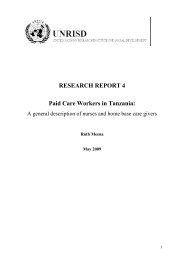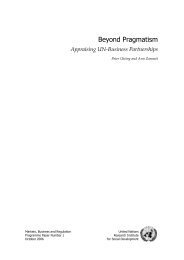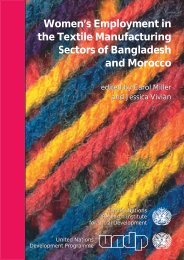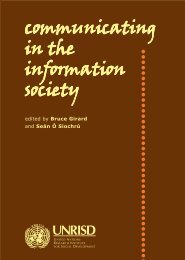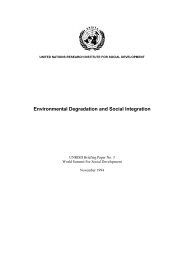The Politics of Gender and Reconstruction in Afghanistan
The Politics of Gender and Reconstruction in Afghanistan
The Politics of Gender and Reconstruction in Afghanistan
You also want an ePaper? Increase the reach of your titles
YUMPU automatically turns print PDFs into web optimized ePapers that Google loves.
THE LEGACIES OF CONFLICT: IS THERE A GENDER SUB-TEXT?<br />
communities <strong>in</strong> the diaspora <strong>and</strong> a rapid monetization <strong>of</strong> the economy constituted significant l<strong>and</strong>marks <strong>in</strong> the<br />
transformation <strong>of</strong> society. Between 1979 <strong>and</strong> 1992, an estimated six million people—more than a fifth <strong>of</strong> the<br />
population—fled their places <strong>of</strong> orig<strong>in</strong> to become refugees or <strong>in</strong>ternally displaced people (IDPs). <strong>The</strong> destruction<br />
<strong>of</strong> the rural <strong>in</strong>frastructure not only impoverished the rural population (with food production fall<strong>in</strong>g by between<br />
half <strong>and</strong> two-thirds) but also weakened the elites whose power depended on the control <strong>of</strong> rural resources. Roy<br />
(1986) chronicles some <strong>of</strong> the pr<strong>of</strong>ound social changes brought about by the Afghan resistance, namely the<br />
decl<strong>in</strong>e <strong>of</strong> the political power <strong>of</strong> the khans (l<strong>and</strong>lords), the grow<strong>in</strong>g <strong>in</strong>fluence <strong>of</strong> the ulama, <strong>and</strong> the rise <strong>of</strong> Islamist<br />
parties, local comm<strong>and</strong>ers <strong>and</strong> autonomous groups as key players. <strong>The</strong> <strong>in</strong>frastructure <strong>of</strong> support for the resistance<br />
funnelled cash <strong>in</strong>to new social networks that skimmed <strong>of</strong>f the pr<strong>of</strong>its to <strong>in</strong>vest <strong>in</strong> smuggl<strong>in</strong>g <strong>and</strong> other bus<strong>in</strong>esses,<br />
most importantly those deriv<strong>in</strong>g from violations <strong>of</strong> the Afghan Transit Trade Agreement (ATTA) between<br />
Pakistan <strong>and</strong> <strong>Afghanistan</strong>. <strong>The</strong> transport <strong>in</strong>frastructure available for smuggl<strong>in</strong>g activities was also deployed for<br />
the arms <strong>and</strong> drugs trades. This led to the growth <strong>of</strong> new strata controll<strong>in</strong>g the pr<strong>of</strong>its from these activities.<br />
Much <strong>of</strong> the evidence about the condition <strong>of</strong> women dur<strong>in</strong>g this period is derived from studies carried out <strong>in</strong><br />
refugee camps. 14 <strong>The</strong>se studies po<strong>in</strong>t to contradictory trends. On the one h<strong>and</strong>, there was evidence <strong>of</strong> the re<strong>in</strong>forcement<br />
<strong>of</strong> patriarchal controls over women, partly due to the <strong>in</strong>securities <strong>of</strong> life <strong>in</strong> exile <strong>and</strong> partly as a<br />
response to the ideology <strong>of</strong> the various jihadi parties that acted as gatekeepers for the distribution <strong>of</strong> <strong>in</strong>ternational<br />
aid. On the other h<strong>and</strong>, for many, this was their first exposure to health, education <strong>and</strong> other social welfare<br />
services, which were largely absent <strong>in</strong> the rural areas from which they orig<strong>in</strong>ated. Many women <strong>in</strong> these uprooted<br />
communities experienced new forms <strong>of</strong> service provision as recipients <strong>of</strong> humanitarian aid. Communities send<strong>in</strong>g<br />
out male combatants also burdened women with new types <strong>of</strong> responsibilities <strong>in</strong> the day-to-day management <strong>of</strong><br />
their households. Some became <strong>in</strong>volved <strong>in</strong> <strong>in</strong>come-generation projects run by non-governmental organizations<br />
(NGOs) <strong>in</strong> refugee camps. Meanwhile, the urban <strong>and</strong> literate women <strong>of</strong> the diaspora started form<strong>in</strong>g women’s<br />
NGOs dur<strong>in</strong>g their years <strong>of</strong> exile. One <strong>of</strong> the best known <strong>and</strong> most controversial among these, the Revolutionary<br />
Association <strong>of</strong> the Women <strong>of</strong> <strong>Afghanistan</strong> (RAWA), was founded <strong>in</strong> 1977 <strong>and</strong> engaged <strong>in</strong> political campaign<strong>in</strong>g<br />
<strong>and</strong> advocacy, alongside humanitarian assistance for women <strong>and</strong> children. 15 <strong>The</strong> number <strong>of</strong> Afghan women’s<br />
NGOs operat<strong>in</strong>g <strong>in</strong> the diaspora <strong>in</strong>creased, establish<strong>in</strong>g women as civil society actors. <strong>The</strong> limited mobilization<br />
<strong>of</strong> women dur<strong>in</strong>g the periods <strong>of</strong> state-led modernization <strong>in</strong> <strong>Afghanistan</strong> received a new impetus through the<br />
experiences <strong>of</strong> displacement <strong>and</strong> exile.<br />
<strong>The</strong> Soviet withdrawal <strong>in</strong> 1989 resulted <strong>in</strong> reduced external aid <strong>and</strong> a fall <strong>in</strong> revenues at a time when the Sovietsupported<br />
Najibullah government was engaged <strong>in</strong> an expensive policy <strong>of</strong> “national reconciliation”, <strong>in</strong>creas<strong>in</strong>g<br />
the economic dependency <strong>of</strong> the population on the state. <strong>The</strong> government responded by <strong>in</strong>creas<strong>in</strong>g the money<br />
supply, lead<strong>in</strong>g to a rapid fall <strong>in</strong> the value <strong>of</strong> the afghani aga<strong>in</strong>st the dollar <strong>and</strong> to soar<strong>in</strong>g <strong>in</strong>flation. <strong>The</strong> destruction<br />
<strong>of</strong> agriculture <strong>and</strong> trad<strong>in</strong>g networks caused a food deficit that could only be palliated by reliance on either food<br />
aid or cash purchases at <strong>in</strong>flated prices. This produced unprecedented <strong>in</strong>centives for cash-produc<strong>in</strong>g activities,<br />
ma<strong>in</strong>ly smuggl<strong>in</strong>g <strong>of</strong> consumer goods <strong>and</strong> grow<strong>in</strong>g <strong>of</strong> opium. <strong>The</strong> latter became the pr<strong>in</strong>cipal exp<strong>and</strong><strong>in</strong>g source<br />
<strong>of</strong> cash <strong>in</strong>comes, provid<strong>in</strong>g casual work for the l<strong>and</strong>less <strong>and</strong> opportunities for credit <strong>and</strong> cash advances for<br />
smallholders <strong>and</strong> sharecroppers.<br />
<strong>The</strong> fall <strong>of</strong> Najibullah <strong>in</strong> 1992 swept the ma<strong>in</strong>ly non-Pashtun mujahid<strong>in</strong> <strong>in</strong>to power. Led by President Rabbani,<br />
the Islamic State <strong>of</strong> <strong>Afghanistan</strong> failed to establish control <strong>of</strong> most <strong>of</strong> the country’s territory beyond the capital<br />
14 Christensen 1984, 1988, 1990; Howard-Merriam 1987; Azarbaijani-Moghaddam 2001.<br />
15 <strong>The</strong> Fem<strong>in</strong>ist Majority <strong>in</strong> the United States did a great deal to promote RAWA dur<strong>in</strong>g the period <strong>of</strong> anti-Taliban mobilization. However, RAWA’s<br />
exclusionary stance vis-à-vis other women’s groups <strong>and</strong> Afghan women <strong>in</strong> the diaspora marg<strong>in</strong>alized them at a time when the realpolitik <strong>of</strong> coalition<br />
tactics among different factions <strong>and</strong> ethnic groups required moderation (Thrupkaew 2002).<br />
PAGE 9




